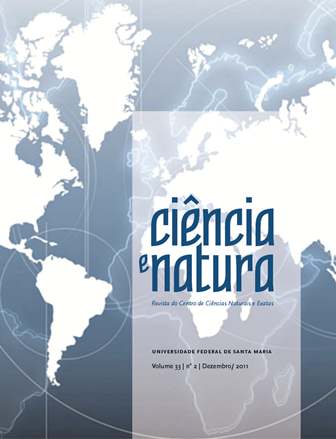Bacteria and Fungal Spores as Ice Nuclei from Coffea Arabica l.
DOI:
https://doi.org/10.5902/2179460X9363Resumo
Microorganismos têm sido encontrados na atmosfera pela primeira vez no final do século XIX century. Alguns destes são bactérias e espécies de fungos com habilidade de atuar como nucleantes de gelo e afetar plantações sensíveis à geada como o café. Consequentemente, geada é um dos maiores problemas para este tipo de plantação no Sul-Sudeste do Brasil. Neste estudo, foram encontados três categorias de organismos com atividade de nucleação de gelo (INA) em folhas de café, tendo por base o ponto de congelamento da solução salina, cerca de -17oC. A primeira categoria, com forte atividade INA, foi encontrada a Pseudomonas syringae var. garceae, um patogênico de folhas de café, como INA+. Pseudomonas syringae var syringae comporta-se com menor efficiência de INA comparando-a à var. garceae (-5oC contra -4oC). Esta última variedade também causa a doença denominada de “mancha aureolada”. A segunda categoria apresentou uma parcial atividade de nucleação de gelo, incluindo duas outras bacterias: Pantoea agglomerans (conhecida por ter INA+) e Corynebacterium, ambas com pontos de congelamento entre -7oC e -10oC. A terceira categoria apresentou nenhuma atividade nucleadora (INA-), com pontos de congelamento abaixo de -11oC, incluindo-se todas bacterias e fungos. Adicionalmente, H.vastatrix, o fungo responsavel pela ferrugem de café, o qual já causa enormes prejuízos aos agricultores, pode estar associado à bactérias INA+, gerando geada. Estes resultados necessitam melhor averiguamento tentando esclarecer como esta associação poderia ocorrer. Portanto, duas doenças de plantações de café, a ferrugem e a mancha aureolada, e a presença da bactéria Pantoea agglomerans podem estar diretamente e indiretamente associados à atividade de nucleação de gelo, demandando maior controle biológico, particularmente durante o inverno devido à possibidade de danos por geada.Downloads
Downloads
Publicado
Como Citar
Edição
Seção
Licença
Para acessar a DECLARAÇÃO DE ORIGINALIDADE E EXCLUSIVIDADE E CESSÃO DE DIREITOS AUTORAIS clique aqui.
Diretrizes Éticas para Publicação de Revistas
A revista Ciência e Natura está empenhada em garantir a ética na publicação e na qualidade dos artigos.
A conformidade com padrões de comportamento ético é, portanto, esperada de todas as partes envolvidas: Autores, Editores e Revisores.
Em particular,
Autores: Os Autores devem apresentar uma discussão objetiva sobre a importância do trabalho de pesquisa, bem como detalhes e referências suficientes para permitir que outros reproduzam as experiências. Declarações fraudulentas ou intencionalmente incorretas constituem comportamento antiético e são inaceitáveis. Artigos de Revisão também devem ser objetivos, abrangentes e relatos precisos do estado da arte. Os Autores devem assegurar que seu trabalho é uma obra totalmente original, e se o trabalho e / ou palavras de outros têm sido utilizadas, isso tem sido devidamente reconhecido. O plágio em todas as suas formas constitui um comportamento publicitário não ético e é inaceitável. Submeter o mesmo manuscrito a mais de um jornal simultaneamente constitui um comportamento publicitário não ético e é inaceitável. Os Autores não devem submeter artigos que descrevam essencialmente a mesma pesquisa a mais de uma revista. O Autor correspondente deve garantir que haja um consenso total de todos os Co-autores na aprovação da versão final do artigo e sua submissão para publicação.
Editores: Os Editores devem avaliar manuscritos exclusivamente com base no seu mérito acadêmico. Um Editor não deve usar informações não publicadas na própria pesquisa do Editor sem o consentimento expresso por escrito do Autor. Os Editores devem tomar medidas de resposta razoável quando tiverem sido apresentadas queixas éticas relativas a um manuscrito submetido ou publicado.
Revisores: Todos os manuscritos recebidos para revisão devem ser tratados como documentos confidenciais. As informações ou ideias privilegiadas obtidas através da análise por pares devem ser mantidas confidenciais e não utilizadas para vantagens pessoais. As revisões devem ser conduzidas objetivamente e as observações devem ser formuladas claramente com argumentos de apoio, de modo que os Autores possam usá-los para melhorar o artigo. Qualquer Revisor selecionado que se sinta desqualificado para rever a pesquisa relatada em um manuscrito ou sabe que sua rápida revisão será impossível deve notificar o Editor e desculpar-se do processo de revisão. Os Revisores não devem considerar manuscritos nos quais tenham conflitos de interesse resultantes de relacionamentos ou conexões competitivas, colaborativas ou outras conexões com qualquer dos autores, empresas ou instituições conectadas aos documentos.






